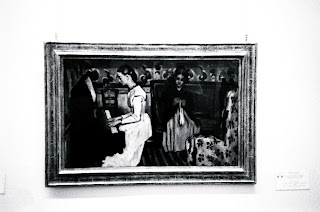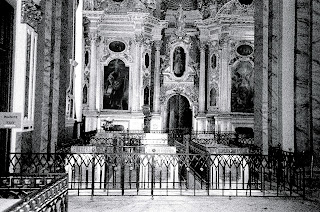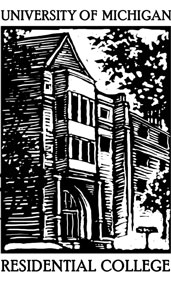Kluev has achieved a cult hero status in Vytegra (and as a result of this, M. Makin.) But what kind of life would Kluev have if he were to live in Vytegra now, as a homosexual man? Our kind guide to the Kluev sites denies his sexuality, and Alina Vladimirovna (as we are calling her nowadays) provided the context the guide left out, so that Kluev's situation could be understood. After all, it was on charges of Homosexuality that he was arrested and one of the reasons he was executed and chucked into a pit. He has become a martyr of the soviet era to the people in Vytegra, but I myself see him as a homosexual martyr to that cause, though that is pretty well lost on this town from what I've seen.I took the opportunity over dinner to ask Sergei how growing up gay in Vytegra would be like. To summarize an insightful and complex conversation, a Hell on earth is what it would be: the city, a coffin and most every peer, a nail holding down the lid that shuts out the light. Despite the kids macking everywhere and abortion being the primary form of birth control, the social conservatism runs deep here, (though I see this as common to most rural areas.)
I walked through Vytegra tonight with a number of the local students looking for an opportunity to discuss the issue with them. I asked two older girls what people here thought of homosexuality. The word "gomikosektsualnost" got quite a response; one girl put a good bit of distance between the conversation and I, saying that it was bad and that she didn't want to talk about it. The other agreed to indulge me and we had a long conversation. Pretty well everyone thought it was bad, (as a few others entered the conversation). She thought that everyone chose their sexuality. I challenged this and asked her to consider the situation if there was no choice. She considered it (more so than I would have expected), and said that it was still unnatural and wrong. I said that cars were unnatural too, but we still drive them.
I said that Kluev was gay. She denied it. I said that we pretty well knew he was gay. She conceded reluctantly and agreed. She asked me about homosexuals in the USA. I said that there were bad regions, but gays were commonly accepted. She said this was not the case with Russia. She said it did not happen in Vytegra (remember that, cause that's important to my point). I said it happened everywhere. I said that I had friends back in Michigan who are gay. I said that I love them, because they're my friends, and that we must embrace our differences. I said that everyone just wants to be happy in their life. She agreed with the last point. I asked "If one of your friends were to tell you he was gay, what would you do?"
She considered that for quite a bit. She said that she would still be his friend, regardless. I inquired why. She said that it was because they were already friends before, and that he was mostly the same person to her.
I thought I was going to combust with something tasting vaguely of victory in my chest.
Setting that aside, the sentiment that homosexuality didn't happen in Vytegra made me want to scream obscenities from the church's bell tower. A man was arrested here less than a century ago for being homosexual - laws against which remained in effect until 1993 - and is later shot, his body left unmarked in a mass grave with nothing remaining but a book of poetry and a picture of Sergei Esenin. That man was none other than Vytegra's most famous poet son, Kluev. I could cut down a tree with a baseball bat before I could say homosexuality didn't exist in Vytegra with a straight face.
What it boils down to is that nobody here wants to talk about it. What, with the way they whisper the word "homosexual" around here, you'd think they were trying to say Voldemort. Dumbledore's words "Fear of the name breeds fear of the man" are ludicrously appropriate here. If the space was safe enough for people to openly admit that they are homosexual, if they could speak up while remaining confident that their name won't be whispered fearfully as "gomikosektualnost'" then people here would realize just how normal being homosexual is.
I will close this message with a new set of competing paradigms in provincial Russia. When we first met the local youth at the Dom Kulturi we played a game. We stood in a circle, each of us facing a Russian counterpoint. We pointed at our noses, saying that we each had one. We pointed at our cheeks, saying that we both had red cheeks. We pointed at the other's chest and said that we both had a heart. We shook hands. We hugged. We became friends. We set aside our differences spanning an Ocean and a language so that we could see each other as the same and worthy of each others' love.
And yet, despite this warm invitation, the same community turns inward to the people that certainly aren't as different from themselves as we are with closed eyes and a closed heart. All that remains there for them is the sound of snow crunching under boots as they walk away - exile and death.
To be sure, these paradigms are not unique here. They were included in the small print on the back of the contract everyone who grows up in a rural community signs at birth. Even then, the cities are guilty of this as well, though there are usually enough people to keep each other in check. I love Vytegra - with its agresticism, beautiful countryside, resourceful folk, and long list of social problems, how could it not feel like a second home? But Kluev's legacy is less a star on the rap sheet than a blemish as seen from my eyes. I can only hope that time, acceptance, and, however insignificant he or she may be, the questioning foreigner with bad Russian can make something of a difference for the youth here.






















































